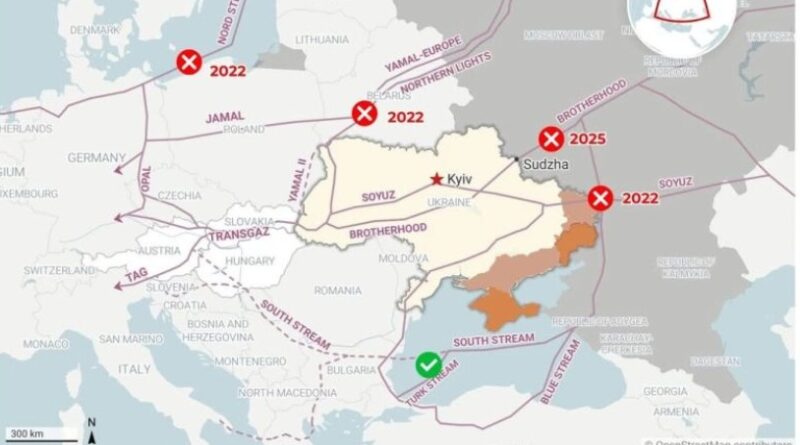The Impact of Increased Russian Gas Volumes and Bulgaria’s Role in the EU Gas Market
The cancellation of the Ukrainian transit for Russian gas has created ripple effects yet to be fully understood. A critical area to monitor is the cross-border gas flows between Turkey and Bulgaria, particularly at the TurkStream entry point—Malkoclar-Strandzha 2. Since the end of 2024, the inflow of Russian gas into Bulgaria has increased by approximately 8 million cubic meters per day, signaling a strategic rerouting of about 15% of transit flows away from Ukraine. Additional volumes may be routed in the future via TurkStream and BOTAŞ’s network, further utilizing the Strandzha entry point.
Current Dynamics
According to Bulgartransgaz data, Russian gas entering Bulgaria via Strandzha 2 now averages 50 million cubic meters per day, up from a daily average of less than 42 million cubic meters in 2024. The majority of these increased volumes are directed toward Serbia and Hungary through the Kireevo-Zajecar cross-border point, with approximately 31 million cubic meters per day flowing along TurkStream.
Currently, over 80% of the gas transported through Bulgaria’s transmission system—exceeding 15 billion cubic meters annually—originates from Gazprom. This statistic underscores Bulgaria’s pivotal role as the sole entry point for Russian pipeline gas into the EU and highlights the country’s dependence on this supply source.
Support Independent Analysis
Help us keep delivering free, unbiased, and in-depth insights by supporting our work. Your donation ensures we stay independent, transparent, and accessible to all. Join us in preserving thoughtful analysis—donate today!
Impact on the EU Gas Market
The increased flow of Russian gas through Bulgaria carries significant implications for the EU gas market:
- Concentration of Supply Routes: Bulgaria’s emergence as the primary conduit for Russian gas into the EU heightens the region’s exposure to supply disruptions. Political or technical challenges along this route could have cascading effects on EU member states dependent on these supplies.
- Undermining EU Diversification Goals: This shift strengthens Gazprom’s dominance in this segment of the European gas market, complicating the EU’s efforts to diversify energy sources, implement common energy policies, and reduce reliance on Russian imports.
- Market Price Volatility: Although market prices currently show relative stability, the increased reliance on a single entry point risks creating disparities between Southeastern European and Western European gas markets. This could exacerbate price volatility, especially during geopolitical tensions or peak demand periods.
Impact on Bulgaria’s Foreign and Domestic Policies
Bulgaria’s role as the gateway for Russian gas heavily influences its domestic and foreign policies:
- Foreign Policy Constraints: Dependence on Gazprom limits Bulgaria’s ability to support EU-wide initiatives aimed at phasing out Russian gas, risking isolation within the bloc and criticism for undermining collective energy security.
- Domestic Policy Challenges: Overreliance on Russian gas transmission reduces Bulgaria’s leverage in negotiating energy agreements and discourages investment in renewables and alternative sources. This perpetuates dependency and weakens long-term energy independence.
- Economic Implications: Transit fees provide a significant revenue stream, reinforcing Bulgaria’s economic reliance on Russian gas. Transitioning away from this model would be politically and economically challenging.
Bulgaria’s growing role as the primary entry point for Russian gas into the EU, while seemingly a strategic asset, increasingly resembles a liability. It enhances Bulgaria’s importance in the regional energy market but amplifies its vulnerability to external pressures and limits its alignment with EU energy objectives.
Ilian Vassilev




